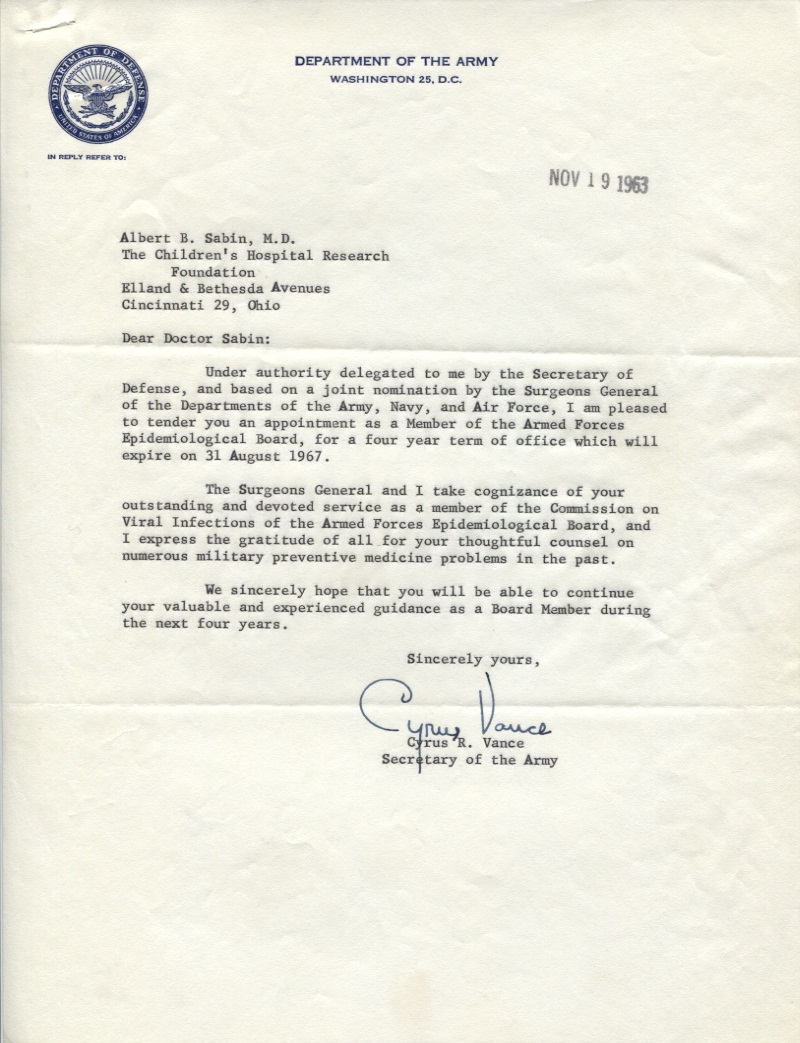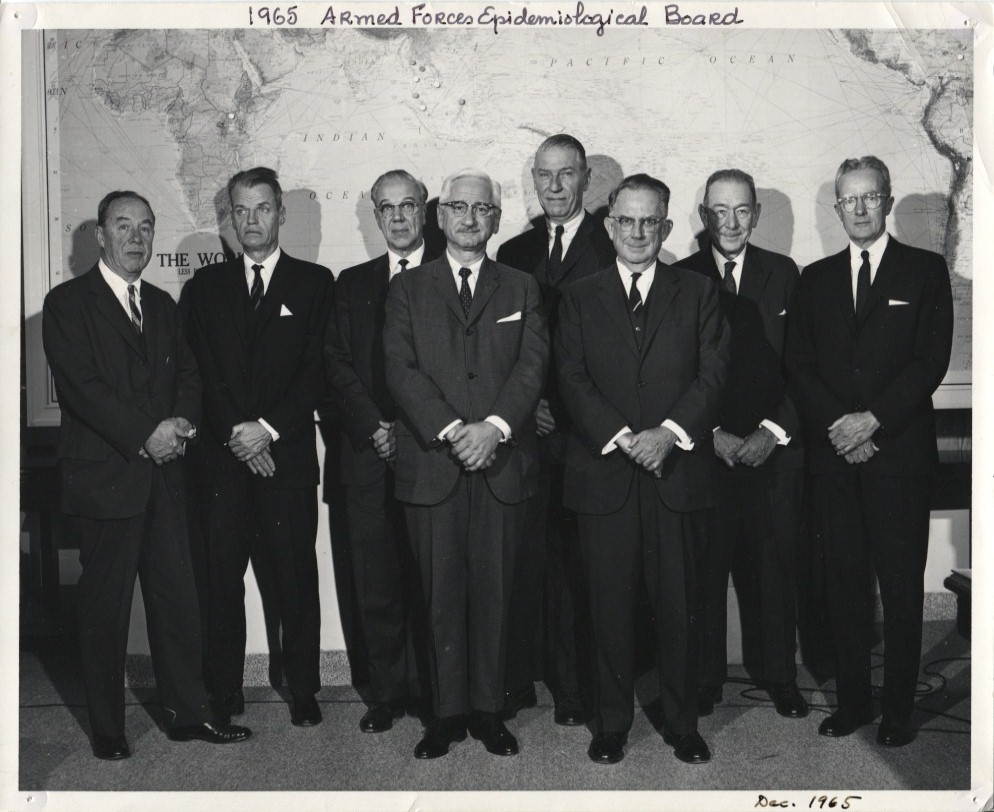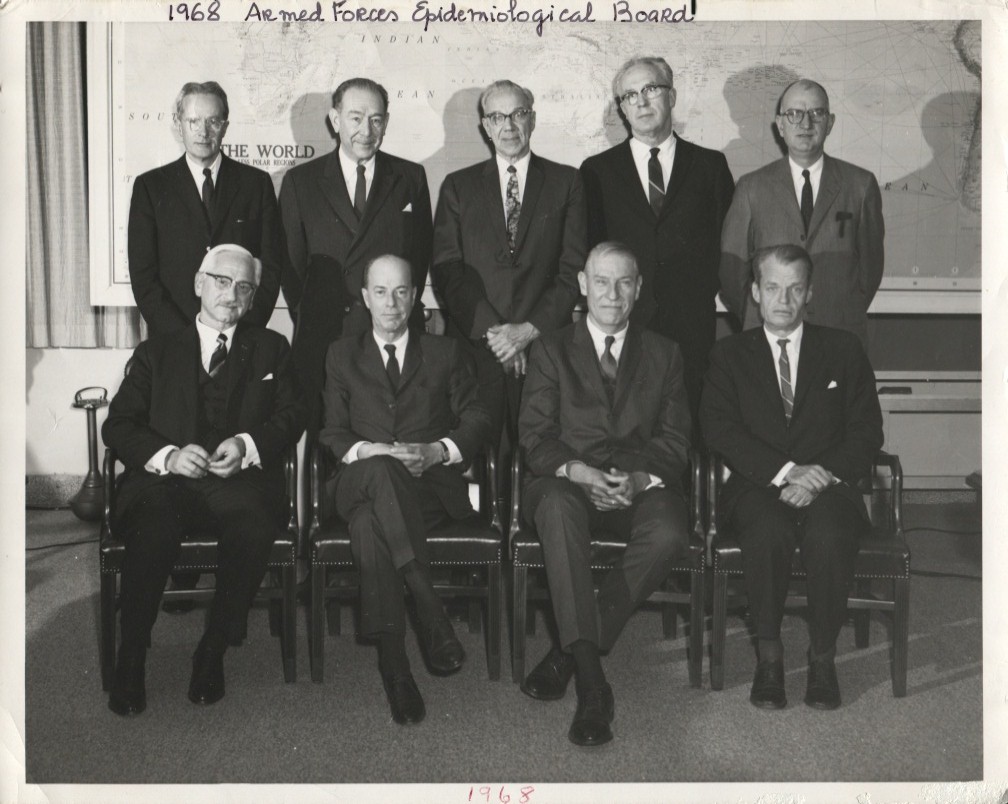
1963 - Letter from Cyrus R. Vance, Secretary of the Army, to Dr. Albert Sabin, confirming his appointment to the AFEB
The past couple of days I have been looking at administrative documents from Dr. Sabin’s time as a member of the Armed Forces Epidemiological Board (AFEB) during the 1960’s, to make sure there are no classified documents in this part of the collection. I thought I would share some things that I have encountered.
In 1963, Dr. Sabin was appointed a member of the AFEB based on a joint nomination by the Surgeons General of the Departments of the Army, Navy, and Air Force for a four year term (see letter to the right). As a member of the AFEB, Dr. Sabin was required to vote on contracts and commission appointments, as well as other issues applicable to military medicine. The memos and letters included in this part of the collection give insight into the issues addressed by the AFEB. They also provide researchers with information about Dr. Sabin’s opinions about these issues, through his own letters to other AFEB members and the notes he scribbled on the various memos he received. Topics included disease prevention and vaccination of troops. Here is just one example of Dr. Sabin’s involvement as a member of the AFEB.
In December 1966, Dr. Sabin attended an AFEB meeting where he mentioned that he might be able to attend a Dengue Task Force meeting, which was part of the Commission on Viral Infections. Dr. William Scherer wrote Dr. Sabin in February of 1967 asking if he would be able to attend to share his ideas “on how to eliminate dengue as a threat to the military.”[1] Since Dr. Sabin had researched dengue for many years for the military, he was quite willing to share his opinions on what the Dengue Task Force might do. One issue he emphasized was researching the type of tissue needed to propagate the dengue viruses for use as a vaccine. He ended the letter by saying:

Photograph of the Armed Forces Epidemiological Board, December 1965. (L-R) Thomas Francis, Jr., Francis S. Cheever, William McD. Hammon, Albert B. Sabin, Gustave J. Dammin (President), Charles E. Smith, Richard A. Kern, John C. Synder (U.S. Army Photograph)
If you do decide to set up a Dengue Task Force I cannot stress sufficiently the importance of a well thought out program in advance of beginning any studies. I should be glad to help in a critical evaluation of any program that may be developed. Furthermore, because there is a lot of work to be done it would be wise to divide up the work among different participants in accord with the part of the overall plan that may appeal to them the most.[2]
Overall, I think that the letters and memos in this part of the collection show just how active Dr. Sabin was, even after he became well-known for the oral polio vaccine. Even though he was not researching dengue at the time, he still made a great effort to stay in touch with those that were, and he was willing to provide insight into the problem when he could.

Armed Forces Epidemiological Board, February 1968. (Seated L-R): Albert B. Sabin, Colin MacLeod, Gustave J. Dammin (President), Francis S. Cheever. (Standing L-R): John C. Snyder, Richard A. Kern, William McD. Hammon, Charles H. Rammelkamp Jr., William S. Jordan Jr. (U.S. Army Photograph)
References
Note: Photographs can be found in Sabin Photograph Binder 1962-1968.
[1] Letter from William F. Scherer to Albert B. Sabin, 8 February 1967. Found in Series Military Service, Sub-Series Armed Forces Epidemiological Board, Box 10, Folder 7 – General, 1967.
[2] Letter from Albert B. Sabin to William F. Scherer, 17 February 1967. Found in Series Military Service, Sub-Series Armed Forces Epidemiological Board, Box 10, Folder 7 – General, 1967.
In 2010, the University of Cincinnati Libraries received a $314,258 grant from the National Endowment for the Humanities (NEH) to digitize the correspondence and photographs of Dr. Albert B. Sabin. This digitization project has been designated a NEH “We the People” project, an initiative to encourage and strengthen the teaching, study, and understanding of American history and culture through the support of projects that explore significant events and themes in our nation’s history and culture and that advance knowledge of the principles that define America. Any views, findings, conclusions, or recommendations expressed in this blog do not necessarily reflect those of the National Endowment for the Humanities.
